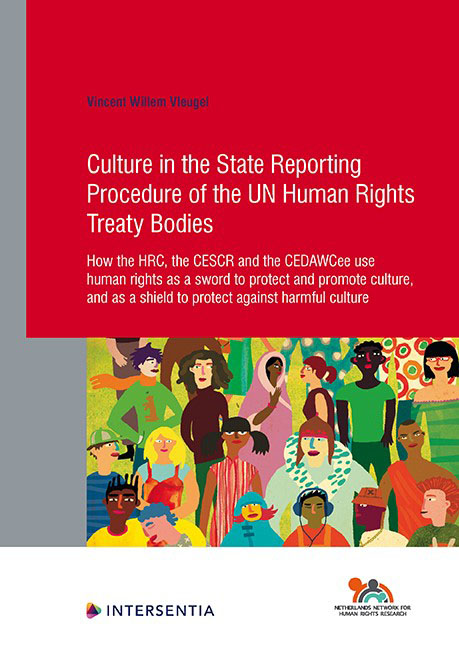 Culture in the State Reporting Procedure of the UN Human Rights Treaty Bodies
Culture in the State Reporting Procedure of the UN Human Rights Treaty Bodies Book contents
- Frontmatter
- Acknowledgements
- Contents
- Abbreviations
- Note on Citation Formats
- Note on Grammar
- Chapter 1 Introduction
- Chapter 2 Human Rights and Cultural Diversity. Between and Beyond Universalism and Cultural Relativism
- Chapter 3 UN Treaty Bodies. Treaties, Committees, Working Methods
- Chapter 4 Human Rights as a Sword. To Protect and Promote Cultural Diversity
- Chapter 5 Human Rights as a Shield. To Protect against Harmful Aspects of Culture
- Chapter 6 Cultural Argumentation. The State Reporting Procedure as a Platform for Cross-Cultural Dialogue
- Chapter 7 Conclusions. How the Treaty Bodies Universalise Human Rights
- Bibliography
- Summary
- Samenvatting
- Human Rights Research Series
Chapter 2 - Human Rights and Cultural Diversity. Between and Beyond Universalism and Cultural Relativism
Published online by Cambridge University Press: 11 November 2021
- Frontmatter
- Acknowledgements
- Contents
- Abbreviations
- Note on Citation Formats
- Note on Grammar
- Chapter 1 Introduction
- Chapter 2 Human Rights and Cultural Diversity. Between and Beyond Universalism and Cultural Relativism
- Chapter 3 UN Treaty Bodies. Treaties, Committees, Working Methods
- Chapter 4 Human Rights as a Sword. To Protect and Promote Cultural Diversity
- Chapter 5 Human Rights as a Shield. To Protect against Harmful Aspects of Culture
- Chapter 6 Cultural Argumentation. The State Reporting Procedure as a Platform for Cross-Cultural Dialogue
- Chapter 7 Conclusions. How the Treaty Bodies Universalise Human Rights
- Bibliography
- Summary
- Samenvatting
- Human Rights Research Series
Summary
INTRODUCTION
Ever since the Universal Declaration of Human Rights (UDHR) was adopted in 1948, the universality of human rights in a world of profound cultural diversity has been the subject of endless controversy. The essence of these debates concerns the tensions inherent in adopting universal standards which can be applied in the different cultural contexts all over the world. How can human rights have universal value, and yet respect and accommodate genuine cultural diversity?
In order to analyse and understand how the UN human rights treaty bodies have dealt with the tensions which occur in the process of monitoring the implementation of what they consider universal human rights across different cultures, it is crucial first to explore the concepts and theories which are the foundation of this research: (1) what is ‘culture’ or ‘cultural diversity’?; (2) why and how do ‘culture’ and ‘cultural diversity’ interact – or even collide – with human rights?; (3) what does existing literature say about possible ways to reconcile ‘culture’ or ‘cultural diversity’ with human rights?
This chapter briefly introduces the concepts and theories which are important to the present research. First, key in avoiding conceptual confusion is an understanding of concepts as ‘culture’ and ‘cultural diversity’ as used in this study. Comprehension of the relation between power and culture is also vital: Culture is open to contestation, and the question of who defines the dominant values of a certain culture should be addressed (section 2.2). The subsequent section provides a brief outline of the diversity of cultures, cultural values and perspectives. It sets out to illustrate the (possible) tensions between the universality of human rights and the diversity of cultural contexts with some (necessarily simplified) observations on the perceived ‘Western bias’ of human rights, and on the major cultural values and ensuing human rights criticisms from Islamic, Asian and African viewpoints (section 2.3). At first, the debate in scholarship was framed in terms of a dichotomous opposition between the claims of cultural relativism and the claims of universality. The positions of universalists and cultural relativists were presented as diametrically opposed.
- Type
- Chapter
- Information
- Culture in the State Reporting Procedure of the UN Human Rights Treaty BodiesHow the HRC, the CESCR and the CEDAWCee use human rights as a sword to protect and promote culture, and as a shield to protect against harmful culture, pp. 17 - 42Publisher: IntersentiaPrint publication year: 2020


